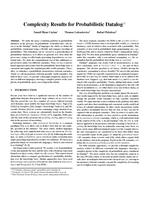Complexity Results for Probabilistic Datalog+/-
Aus International Center for Computational Logic
Complexity Results for Probabilistic Datalog+/-
İsmail İlkan Ceylanİsmail İlkan Ceylan, Thomas LukasiewiczThomas Lukasiewicz, Rafael Peñaloza NyssenRafael Peñaloza Nyssen
İsmail İlkan Ceylan, Thomas Lukasiewicz, Rafael Peñaloza Nyssen
Complexity Results for Probabilistic Datalog+/-
In Maria S. Fox, Gal A. Kaminka, eds., Proceedings of the 22nd European Conference on Artificial Intelligence (ECAI 2016), 1414–1422, 2016. IOS Press
Complexity Results for Probabilistic Datalog+/-
In Maria S. Fox, Gal A. Kaminka, eds., Proceedings of the 22nd European Conference on Artificial Intelligence (ECAI 2016), 1414–1422, 2016. IOS Press
- KurzfassungAbstract
We study the query evaluation problem in probabilistic databases in the presence of probabilistic existential rules. Our focus is on Datalog+/- family of languages for which we define the probabilistic counterpart using a flexible and compact encoding of probabilities. This formalism can be viewed as a generalization of probabilistic databases as it allows to generate new facts from the given ones using the so-called tuple generating dependencies, or existential rules. We study the computational cost of this additional expressiveness under two different semantics. First, we use a conventional approach and assume that the probabilistic knowledge base is consistent and employ the standard possible world semantics. Afterwards, we introduce a probabilistic inconsistency-tolerant semantics, which we refer as inconsistency-tolerant possible world semantics. For both of these cases, we provide a through complexity analysis relative to different languages; drawing a complete picture of the complexity of probabilistic query answering in this family. - Forschungsgruppe:Research Group: AutomatentheorieAutomata Theory
@inproceedings{CLN2016,
author = {{\.{I}}smail {\.{I}}lkan Ceylan and Thomas Lukasiewicz and Rafael
Pe{\~{n}}aloza Nyssen},
title = {Complexity Results for Probabilistic Datalog+/-},
editor = {Maria S. Fox and Gal A. Kaminka},
booktitle = {Proceedings of the 22nd European Conference on Artificial
Intelligence (ECAI 2016)},
publisher = {IOS Press},
year = {2016},
pages = {1414{\textendash}1422}
}
